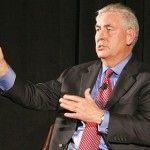US President elect Donald Trump has picked Rex Tillerson, Chairman and CEO of ExxonMobil, to be his secretary of state. Tillerson will be the fourth businessperson–after Wilbur Ross, Steven Mnuchin and Andrew Puzder–to have joined the Trump administration and is easily the most high-profile as head of one of the largest global companies. His appointment could signal a desire on Trump’s part to reset his country’s relations with Russia. Exxon, which has been headed by Tillerson since 2006, has had a long and productive engagement with Russia, which, in 2013, honoured him with the Order of Friendship
ExxonMobil has large investments in oil exploration globally, including in Russia, which is one of the few countries with large petroleum reserves that allow foreign companies to have equity participation in major projects.
ExxonMobil is a lead partner and operator on the Sakhalin-1 oil project in Eastern Russia with a 30% share. India’s ONGC has a 20% stake in this project. For over a decade, till it acquired a stake in another Russian oil field, this was ONGC’s prime international asset.
In 2011, Exxon signed an agreement with Russia’s state-owned oil major, Rosneft, for exploration in prospective regions of the Russian Arctic, which was further expanded in 2013 to include an additional area of half a million square km. A well, jointly owned by Exxon and Rosneft as a part of this venture, struck oil in 2014 – over 750 million barrels of oil and 330 billion cubic meters of gas. However, the company couldn’t follow through on this project due to sanctions imposed on Russia on the Ukraine/Crimea issue. In October 2015, Exxon and Rosneft jointly and successfully bid for exploratory blocks off Mozambique, where large gas discoveries have been made in the recent past. Rosneft also holds a stake in an oil-sands project in Canada, which is being developed by a subsidiary of Exxon’s.
Clearly, Exxon’s views on Russia are significantly different from the State Department’s. Exxon is merely one of the Western oil majors to have been more pragmatic than the government in its country in dealing with Russia. For instance, British oil major BP has been present in Russia for almost two decades now – its joint venture in Russia, TNK BP, generated profits of $55 billion for the company from 2003-12. This venture was subsequently sold to Rosneft for cash and equity. BP currently has a 19.75% stake in Rosneft, which accounts for a large chunk of the company’s petroleum reserves.
For India too, Russia is a major energy partner of increasing importance – Indian public sector companies have invested over $14 billion in Russian oil fields, which account for 70% of India’s entire overseas equity oil production.
Western oil companies–as opposed to politicians–see Russia as a stable and reliable partner. As an oil aficionado who has dealt with Russia for years, Tillerson—compared to the political appointees–is likely to see the country differently, which could lead to some rethinking in the US State Department, more balanced relations between the two powers and a more stable oil market.
Amit Bhandari is Fellow, Energy & Environment Studies, Gateway House.
This blog was exclusively written for Gateway House: Indian Council on Global Relations. You can read more exclusive features here.
For interview requests with the author, or for permission to republish, please contact outreach@gatewayhouse.in or 022 22023371.
© Copyright 2016 Gateway House: Indian Council on Global Relations. All rights reserved. Any unauthorized copying or reproduction is strictly prohibited.


